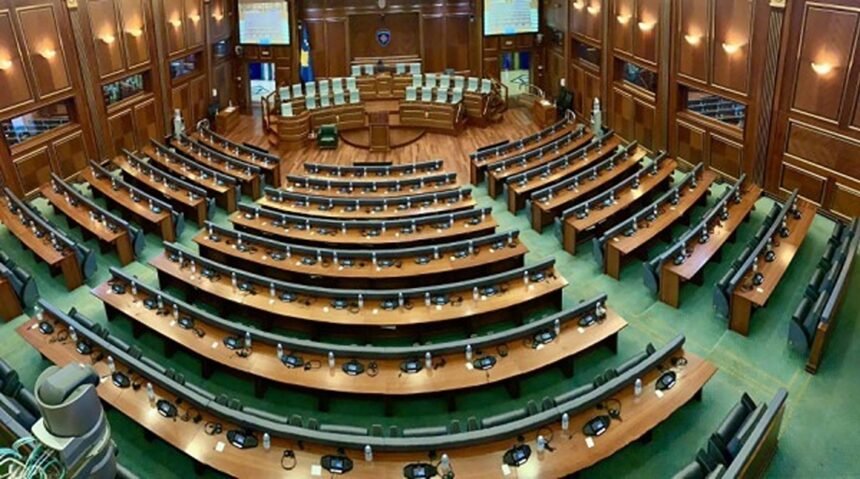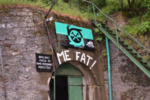Since April 15, the Assembly of Kosovo, formed after the February 9, 2025 elections, has failed to constitute itself. Two months after the inaugural session began, deputies of the ninth legislature have convened 32 times without reaching an agreement on the Speaker’s name or the method of their election.
Lëvizja Vetëvendosje (LVV), as the party with the most mandates from the last elections, initially proposed Albulena Haxhiu for the position. After she failed to secure enough votes, LVV suggested establishing a Commission for Secret Voting.
Constitutional Court’s Pending Decision
The change in the voting method during the procedure was opposed by the former opposition parties, and on May 12, 2025, the matter was sent for interpretation to the Constitutional Court at the initiative of the Alliance for the Future of Kosovo (AAK). Since then, the Constitutional Court has not issued a judgment on the matter, while PDK, LDK, and AAK are awaiting an explanation from the court to decide on their next steps.
The LVV, with 48 deputies in the Assembly, states it respects the Constitutional Court’s decision but invites deputies to participate in the vote. “We respect the judgment of the Constitutional Court, but we must first have it. I call once again on the deputies of the Assembly of Kosovo, in accordance with the judgment of the Constitutional Court and their rights and obligations, to participate in the vote, and since we tried open voting, let’s also try secret voting, because that’s how the Constitutional Court’s judgment from 2014 also foresees it,” declared Albin Kurti, head of LVV, on June 16, 2025.
Time Kadrijaj, Head of the Parliamentary Group of the Alliance for the Future of Kosovo, who submitted the request to the Constitutional Court for the assessment of the constitutionality of the proposal to form the Commission for Secret Voting for the Election of the Speaker, stated in a press conference that the request was signed by 11 deputies from AAK, LDK, and PDK. “We urge the actors to treat it with priority, perhaps even with a temporary measure to stop holding sessions until the Court addresses this matter and makes a decision,” Kadrijaj declared to the media on May 12, 2025. On June 9, 2025, she also expressed hope that the Constitutional Court would offer an alternative to prevent similar political stalemates in the future.
On the same day, Besian Mustafa stated that LDK is the first party to respect every decision of this court. “The Constitutional Court is unable to find solutions for political impasses, but only for legal and constitutional ones. We would accept any decision of the Constitutional Court,” Mustafa declared. PDK also awaits the Constitutional Court’s decision. Mërgim Lushtaku, a deputy from this party, stated on June 7, 2025, that they are waiting for this decision. “There is no reflection on changing anti-constitutional and anti-legal actions. As the opposition, we have sent the issue to the Constitutional Court. It is evident that the process of constituting the Assembly is being neglected, while citizens’ problems are deepening. This is regrettable, as no readiness for reflection is seen from the parliamentary majority,” Lushtaku stated.
Differing Views on Breaking the Deadlock
Parties also hold different opinions on how to break the deadlock while awaiting the Constitutional Court’s judgment.
“Unity Government” or “Opposition Bloc Government”
Lumir Abdixhiku, head of LDK, has proposed a 15-point plan for a transitional-unity government. On June 12, 2025, he stated that these 15 points, included in this agenda, have the authorization of the LDK Presidency and Parliamentary Group. The LDK leader said that it must be accepted that Kosovo is in a political, institutional, and legitimate crisis, as, according to him, there is no effort to form the country’s institutions. “We do not have a majority; neither side has the numbers to form a majority. Other leaders are saying that the opposition parties have the majority – [this] is not true,” he said.
Memli Krasniqi and Ramush Haradinaj, the heads of the other two former opposition parties, PDK and AAK, hold a different stance from Abdixhiku. They favor a government formed by the former opposition parties. “PDK is committed and convinced that the best solution for the country is the formation of a new government, composed of the parties that were in opposition in the previous mandate. A government that would stop institutional degradation, would extract Kosovo from international isolation, and would implement developmental policies for all citizens, without distinction. With an agreed list of state priorities that would bring Kosovo back on the right path of Euro-Atlantic development and integration,” stated a PDK communiqué dated May 7, 2025. “AAK is committed and working for the government to be formed by the opposition, in case of impossibility or non-formation by the position,” Haradinaj told the media on May 14, 2025.
Focus on Local Elections and Global Impacts
While the Assembly remains unconstituted and a new government is not being elected, the country’s President, Vjosa Osmani, has set the date for local elections for October 12, 2025. “This decision was made after careful consideration of the proposals of political entities, as well as after a complete analysis, in accordance with constitutional and legal deadlines,” stated the Presidency’s announcement on June 9, 2025.
Kosovo’s parliamentary parties have already begun to focus on the local elections by officially announcing candidates for municipal mayors.
- LVV has nominated Hamdi Bytyqi in Suhareka, Halil Thaçi in Obiliq, Qemajl Aliu in Shtime, Alban Hyseni in Gjilan, Valon Prebreza in Fushë Kosovë, Ramiz Rrusta in Klinë, Egzona Tërdevci in Drenas, and Shpejtim Bulliqi in Podujevë.
- PDK spokesperson Faton Abdullahu confirmed on KallxoPërnime that Uran Ismaili will be the candidate for Pristina, Shaqir Totaj for Prizren, and Ferit Idrizi confirmed his candidacy for the mayor of Vushtrri.
- LDK Deputy Leader Lutfi Haziri confirmed on KallxoPërnime that the current mayors from this party will also run in these elections, meaning Përparim Rama will be in Pristina, Bexhet Xheladini in Dragash, Sokol Haliti in Viti, Xhafer Gashi in Obiliq, Gazmend Muhaxheri in Peja, Ruzhdi Shehu in Junik, Ilir Ferati in Istog, Imri Ahmeti in Lipjan, while Visar Azemi in Ferizaj and Arbër Ismajli in Gjilan have also been confirmed.
- AAK, meanwhile, has confirmed Bekë Berisha as candidate for Pristina, Ardian Gjini for Gjakova, Ali Berisha for Peja, Bali Muharremaj for Suhareka, Smajl Latifi for Rahovec, Zenun Elezaj for Klinë, Bashkim Ramosaj for Deçan, and Ajet Avdyli for Novobërda.
Effects of Global Conflicts
While the Constitutional Court’s decision on the secret ballot is pending, the Assembly remains unconstituted, and parties are focused on local elections, other developments are unfolding both domestically and globally.
The latest conflict has erupted between Israel and Iran on June 13, 2025. This has led to an increase in fuel prices in Kosovo. Fadil Berjani, head of the Petroleum Association, wrote on June 16, 2025, that fuel prices are rising precisely due to these tensions. “This is causing fear of supply disruptions, influencing price increases. Iran produces a large part of the world’s oil and controls the Strait of Hormuz, a point through which approximately 20% of the world’s oil passes,” Berjani wrote. According to him, the price of diesel in Kosovo ranges from 1.14 euros to 1.24 euros, while gasoline ranges from 1.15 euros to 1.25 euros.
Prior to this development, increases in other product prices were also announced. As of June 1, 2025, large businesses in Kosovo—those with over 50 employees and over 10 million euros in turnover—entered the free energy market, based on a decision by the Energy Regulatory Office (ERO). Businesses have warned that because, as they claim, there is no free energy market and the offers received from suppliers are very high, there will be price increases for products, they risk closure, and are forced to lay off employees.
Lulzim Rafuna, president of the Chamber of Commerce of Kosovo, stated on KallxoPërnime that there is no competition in Kosovo’s energy market. “Some businesses have closed, they are completing the closure procedures, they have 200 workers, it’s a manufacturing factory, 100% export-oriented. The workers were informed that as of June 1, they would no longer be factory workers, but if something changes, they would be called back. Another company informed 50 workers that there would be reorganization, and they couldn’t continue after Bajram,” Rafuna declared on “KallxoPërnime.” However, Rafuna says the problem is that out of the 19 suppliers given to ERO as a list, only three are licensed in Kosovo. KESCO’s offers, according to him, were 200 to 400% more expensive than what businesses were paying. “KESCO has submitted offers, but there is no agreement. KEK supplies us for 60 days, that’s according to law; it supplies us until July 30, 2025. KEK is also licensed for another 6 months as a last-resort supplier, whether it is obliged to supply for 6 months, I don’t know,” Rafuna stated.
The Energy Regulatory Office, which made the decision to place businesses in the free energy market, legally reports to the Assembly of Kosovo. The mandate of the Kosovo Assembly officially ended on March 22, 2025, marking the 4th anniversary of its constitution in the eighth legislature. Since the ninth legislature of the Assembly has not been able to constitute itself since April 15, there is consequently no Assembly for ERO to report to.







